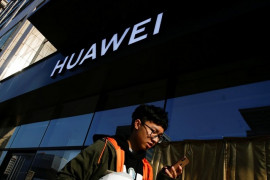1705416767-0/BYD-EXPLORER-NO-1-vehicle-carrier-vessel-(1)1705416767-0.jpg)
BYD Explorer No 1, a vehicle carrier vessel leased to Chinese automaker BYD, held its maiden voyage ceremony on Monday at a port in Shenzhen, south China’s Guangdong province.
With more than 5,000 new energy vehicles (NEVs) on board, it will set sail for the ports of Vlissingen in the Netherlands and Bremerhaven in Germany.
It is the first vessel in the shipping fleet of BYD, which has joined a number of Chinese automakers in accelerating car exports by operating their own shipping fleets.
According to China International Marine Containers (Group) Co Ltd (CIMC), the vessel was built by CIMC Raffles, a subsidiary of CIMC, for international ship management company Zodiac Maritime and was leased to BYD.
The vessel was delivered on Tuesday to a construction base in Longkou, east China’s Shandong province, before sailing to Yantai Port to be loaded with the first batch of 1,389 NEVs. On Sunday, the vessel arrived at Shenzhen and was loaded with the second batch of some 4,000 NEVs.
According to China’s General Administration of Customs, China’s auto exports surged to 5.22 million vehicles in 2023, up 57.4% year on year. As the country’s automobile industry embraces a new export era, automakers are grappling with challenges such as soaring rents, shipping capacity constraints, and intense competition for available car carriers.
Data from global shipping research institution Clarksons Research shows that from August 2020 to the end of November 2023, the one-year time charter rate for a 6,500 car equivalent unit (CEU) pure car and truck carrier (PCTC) had soared from $10,000 per day to $115,000 per day, an increase of more than 10 times.
Read Chinese automakers embrace export boom with own shipping fleets
To bolster automobile exports, major Chinese automakers, including BYD, Chery, and SAIC, have ventured into establishing their own fleets. Notably, Guangzhou Shipyard International Company Limited successfully implemented an order for two BYD PCTCs on January 23, 2023, while Chery Group subsequently announced plans to establish its own global shipping fleet.
SAIC’s Anji Logistics, in the past two years, has also ordered a number of large car carriers exceeding 7,000 vehicles each from the Jiangnan Shipyard.
In recent years, the concentration of the global automobile shipping market has remained high, with automakers in Japan, Korea and other countries having deep ties with the transportation link. According to data from the research institute of China Merchants Bank, as of November 2021, the global capacity of the top 10 car transport shipping companies – mainly from Japan, Korea and European countries – accounted for 59.42% of the market share, while the car transport capacity of Japan and Korea is mostly occupied by their domestic car manufacturers.
Previously, China’s status as a major auto exporter was limited, resulting in minimal emphasis on building an independent shipping fleet. Currently, China has 39 car carrier vessels with a total of 115,000 CEU, representing 2.8% of the global shipping capacity.
Published in The Express Tribune, January 17th, 2024.
Like Business on Facebook, follow @TribuneBiz on Twitter to stay informed and join in the conversation.




1716998435-0/Ryan-Reynolds-Hugh-Jackman-(3)1716998435-0-165x106.webp)







1705417528-0/BYD-EXPLORER-NO-1-vehicle-carrier-vessel-(3)1705417528-0-270x192.webp)






1730706072-0/Copy-of-Untitled-(2)1730706072-0-270x192.webp)
COMMENTS
Comments are moderated and generally will be posted if they are on-topic and not abusive.
For more information, please see our Comments FAQ